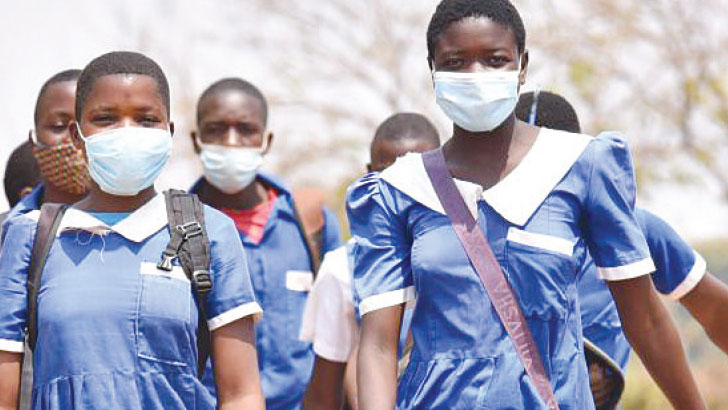Better late than never
Enifa vividly remembers Monday, January 8 2020, when she walked back to Mlale Primary School, south of Lilongwe City, for the first time after spending two years in marriage.
“I couldn’t wait to get back to class and revive my dream to become a doctor, but I didn’t know how my peers would welcome me,” recalls the 17-year-old girl, who dropped out aged 14 to give birth.
Enifa delivered a baby girl in September 2017 after marrying her 19-year-old suitor.
“We agreed to marry, but I didn’t tell my parents. On June 8 2017, I escaped empty-handed in the night, walking on my toes like a cat because I wanted to be free. However, it was a big mistake,” she says.
Enifa left the marriage after two years of worsening hunger and poverty.

“We lacked basics such as food and soap. Besides, I had no say on family affairs. My ex-husband used to beat me and kicked me out for asking about things that would affect me,” she recalls.
The couple used to wake up early to work for low pay in neighbouring crop fields while their peers walked to school.
Enifa returned to school following advice from a mothers’ group sent by headteacher Rose Gwande.
The concerned women encourage girls in Khomani Village to stay in school.
“I feel lucky that the headteacher visited me twice and said the same thing the mother group told me: I was too young to marry,” she says.
Enifa found herself out of school again in March 2020 when the coronavirus pandemic disrupted learning for six months.
“It was a huge disturbance just when I had settled down and started catching up,” she explains.
The Ministry of Gender, Community Development and Social Welfare reports that almost 13 000 teen pregnancies and 40 000 child marriages occurred during the emergency school break.
The lengthy shutdown left Enifa under pressure to remarry.
“I wish schools remained open with strict coronavirus preventive measures. After wasting two years, I couldn’t bear another delay. Some people started pestering me to reunite with my ex-husband, saying I was wasting my best years in school,” she explains.
Enifa now knows marriage can wait.
“I will marry when I am old enough. Currently, I am safer in school,” she asserts.
Her mother, Anesi Kadango, takes care of the baby when Enifa goes to school.
The girl warns her peers against premarital sex.
“I am happy to be back to school. Both teachers and learners welcomed me joyfully. I share my experience because education is almost everything for poor girls,” Enifa says.
Her mother is happy that “Enifa has learnt her lesson”.
She narrates: “When I asked her if she was pregnant, my daughter refused and disappeared while I was fast asleep. I was disappointed. Now I’m pleased that she is back in school.”
Kadango regrets not promptly withdrawing Enifa from marriage.
“I didn’t know that teen mothers have a right to return to school. I thought it was okay because we believed that if a girl was pregnant, she was old enough to marry. But it’s better late than never,” she says.
The mother-of-four wants her first-born to excel in school to uplift herself and liberate her family from poverty.
There are three teen mothers at her school.
“Many parents in this area do not value girls’ education, so there is need to sensitise them and the community leaders to keep girls in school and bring teen mothers back,” headteacher Gwande explains.
She says that falling pregnant or marrying young is not the end of life.
The readmission policy supports the global Sustainable Development Goals to end poverty and inequalities by ensuring quality life-long learning for every child.
However, dropout rates remain high in Malawi where nearly half of girls marry before their 18th birthday while a third get pregnant aged 15 to19.
The adolescent girls account for a quarter of all pregnancies, according to the 2015 Malawi Demographic Health Survey.
Besides, a third of all new HIV cases in 2018 were aged 15 to 24.
Limited sexuality education, prevailing myths and misconceptions about contraceptive use derail efforts to tackle adolescent fertility.
With support from the Swedish Government, four United Nations agencies—Unicef, UNFPA, World Health Organisation, UNAids—have partnered with the Government of Malawi in delivering an integrated package of sexual and reproductive health services, HIV sensitive interventions and gender-based violence prevention.
The joint programme is being implemented in areas where teenage pregnancy, HIV infection as well as sexual and gender-based violence remain high.
The change agents help young people like Enifa to make informed decisions about relationships and sexuality. They also provide care and treatment to adolescents living with HIV.
Unicef is also supporting the training of social welfare officers and community child protectors to swiftly handle cases of child abuse, rights violations and exploitation.
Bridget Mwale, assistant social welfare officer in Lilongwe, says the push to keep girls in school will flop unless parents take full responsibility as primary caregivers.
She states: “The high rates of early pregnancy and marriage, especially during the Covid-19 pandemic, show the need to sensitise parents and community leaders to take child protection seriously and make laws work.
“Following the case management training, cases once concealed are being detected and handled faster than before.”





